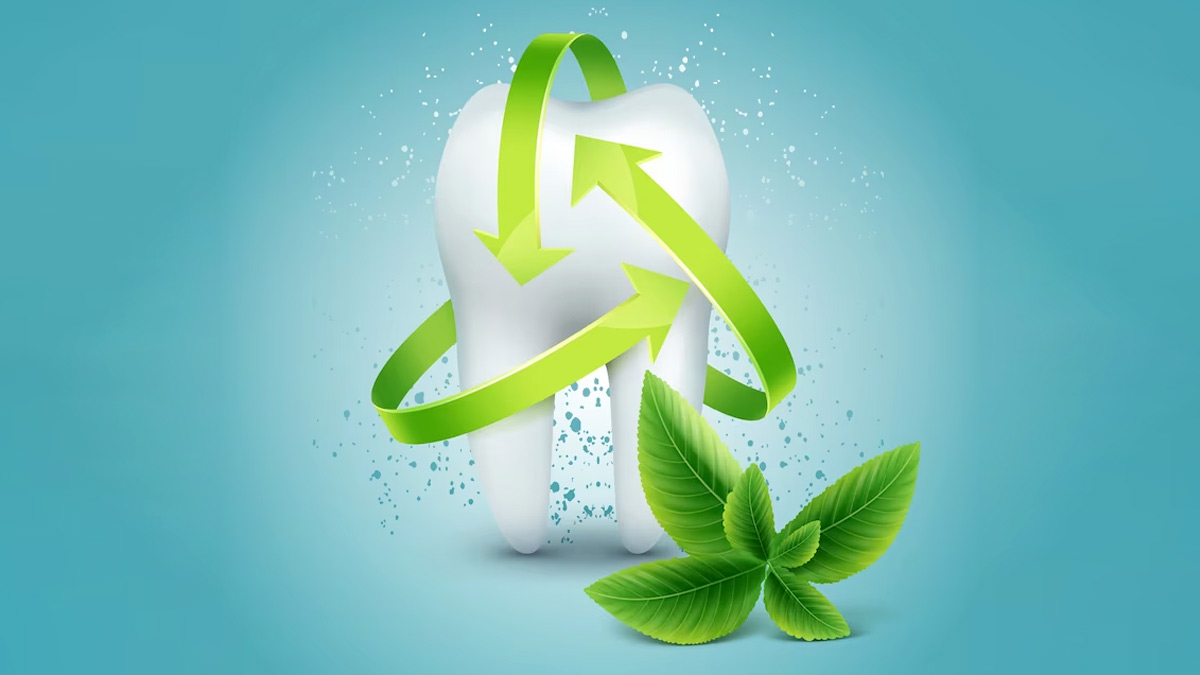
Mint is an aromatic herb, and its essence can be found in various products, like toothpaste, mouthwash and many more. Because of mint, you experience that cooling sensation in your mouth after brushing with mint toothpaste. Since it contains menthol, which works well in teeth-cleaning treatments, mint is associated with dental health. Menthol in mint stimulates the neurological system, which the bodies perceive as the tingling and cooling sensation, recognised as freshness and cleanliness. Clinical studies have supported its anti-inflammatory, antimicrobial, and saliva-stimulating effects, which are crucial for maintaining oral health. Keep reading to learn how mint benefits in maintaining your oral health.
Table of Content:-

Kills Germs
Due to its inherent antibacterial properties, mint is particularly beneficial to dental health. In other words, it eliminates oral microorganisms that may otherwise cause tooth decay. Mint freshens breath while also preventing cavities and gum diseases by killing dangerous germs in the mouth. When you chew mint leaves, you are not adding any additional sugar to your mouth, making it extremely harder for germs to flourish. Another positive impact on dental health from chewing mint leaves is increasing salivation. Saliva serves as a natural mouthwash, washing away germs and any food particles that may serve as food sources for bacteria.

Also Read: 6 Scientifically Backed Health Benefits Of Mint
Provides Nutrients
Plants of the mint family provide essential vitamins and minerals to our bodies when consumed in the right amounts. Mint leaves are rich in vitamins A, B6, and C, which supports strong bone mass. Calcium, potassium, iron, phosphorus, and magnesium in mint help to increase the density of your skeletal system, jaws, and teeth. Since mint is a potent antioxidant, it can aid our systems in repairing cellular damage. To have these benefits, you should consume mint in appropriate quantity.
Relieves Swelling
Because of its potent antioxidant effect, mint is often credited as having anti-inflammatory properties. High antioxidant levels found in mint help in minimising bleeding, enhancing healing, and avoiding swelling. This is particularly crucial for dental health since mint consumption also helps reduce bleeding and relieve swollen gums following invasive oral surgery, such as tooth extraction. Additionally, its antimicrobial properties aid in infection prevention and limit bacterial development. You may prepare a mint rinse by allowing mint tea to cool and then rinsing the mouth with it.

Also Read: Mint Is The Best Summer Skin Care Ingredient, Read Its Benefits and Use
Helps Digestion
Mint has a strong aroma, and chewing it stimulates the salivary glands and the synthesis of certain enzymes. Foods are broken down during this phase, making digestion simpler. Mint also alkalise the body, which balances out any acidic foods you may consume. It helps maintain the body's pH levels and guard against the harmful effects of an acidic pH level. Furthermore, mint can regulate the pH levels in the mouth, which inhibits the development of germs that cause tooth decay, gum disease, and other significant oral disorders.
Bottomline
There are over various species of mint, most of which are edible to humans. Menthol, the substance that gives mint its distinctive cooling effect in the mouth, activates the body's natural cold responders in soft tissue. Make sure you chew the appropriate quantity of mint to have benefits. To have benefits, you can use a mouthwash containing mint.
Image Credits: freepik
Also watch this video
How we keep this article up to date:
We work with experts and keep a close eye on the latest in health and wellness. Whenever there is a new research or helpful information, we update our articles with accurate and useful advice.
Current Version